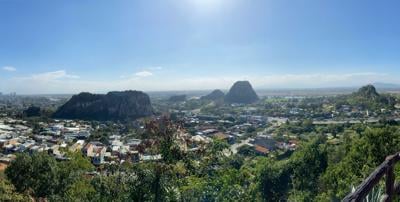Editor’s note: This is the second part of a two-part story, the first part of which ran last summer.
For a stand-still moment, we two brothers were reunited 8,500 miles from home during the Vietnam War. I had been catapulted off the USS Kitty Hawk, 40 miles off the coast of Vietnam. Final destination — Cam Ranh Bay, South Vietnam, 361 miles south of Da Nang — an emergency leave to assure myself that my brother’s wounds were not lethal, at least not immediately.
The aerial views on the flight to Da Nang had been spectacular. Ships that looked like toys, bobbing up and down in a bathtub, projecting the awesome force of America’s Navy. Trails of snow-white “wakes” following each ship as they continued their missions.
But when we landed in Da Nang the vision erupted.
“Dive!” came the voice from a group of soldiers evacuating the airport — men carrying weapons of war, dressed in camouflage. Looks of terror, exposing the innocence under their suntanned faces.
I had no weapon. No way to defend myself, a stranger in a hostile land. The only weapon that I had ever shot was a single-shot, 20-gauge shotgun, used for pheasant hunting. And pheasants don’t shoot back.
Boom! Boom! Boom! I knew that sound. Eighteen months ago. The USS Forrestal disaster. Now more bombs.
“Keep moving,” came the voice from the rear. And so, I did, until we were a quarter-mile from where all hell had broken loose. How would I traverse 361 miles of mountainous, sometimes swampy, terrain? I was on my own, a jet mechanic by trade. No preparation, no direct orders detailing when, where, what or how I should proceed.
I spotted a makeshift passenger terminal, with crowds of soldiers queuing to secure flights home, or heading further in country — into the bowels of this hot and humid, war-ravaged country. I approached a Marine guarding the perimeter and explained my situation. He pointed to a helicopter that was about to take off.
“The chopper routinely heads south. They may be able to help you,” the Marine said.
The pilot was comforting and sensitive to my need to get to my brother. He signaled to the crew and me to get aboard.
“We can take you as far as Camp Granite, but first we’ll be making a quick stop to deliver supplies to a small village,” the pilot said.
Views of rice paddies, oxen, lush green jungles appeared as the chopper began to descend into a thicket of bamboo. It was a landing zone so small that it seemed impossible that the chopper could navigate the perimeter. After a short stop, the pilot was anxious to leave and made altitude quickly.
Then, as the sun slowly lowered itself in the western mountains, Camp Granite emerged as my stay for the night.
Early morning, I was on a flight to Cam Ranh Bay. The plane executed a low takeoff, avoiding exposure to enemy ground fire.
My prayer was answered as my brother was still there — strolling down the sidewalk, in a wheelchair, wounds serious enough to earn him a trip home.
But now the stand-still moment was done and the flashbacks consumed me as I journeyed north to find a plane headed to the Kitty Hawk.
Landing on a carrier is very different than catapulting off — sit back, head firmly planted in the headrest, do NOT look out the window on final approach. Do NOT tilt your head to the side and look out the window, as the extreme force of the landing could slam your face into the window.
I could not resist a quick glimpse of the mighty Hawk.
“Bam!” A hard landing. My nose hitting the starboard window — bloody and broken. Swelling and bruising were immediate. Lots of good laughs from my peers. A lifetime of nasal problems.
And now, 54 years later, I realize it was a miracle that neither of us were killed.
Fortunately, we had many more years together before my brother succumbed to complications of Agent Orange. A post Vietnam life filled with adventure, new dreams — and yet, increasing pain as we continued to find those traumatizing moments resurfacing beyond our control.
Dreams come true amid the pain that haunts us.
The author lives in Lititz. To read his first “I Know a Story” column about his time in Vietnam, visit lanc.news/VietnamStoryPart1.
If you know an interesting story, please write it in 600 words or less and send it to Mary Ellen Wright, LNP editorial department, P.O. Box 1328, Lancaster, PA 17608-1328, or email it to features@lnpnews.com. Please include your phone number and the name of the town you live in.


![He recalls caring for 'tiny miracle' during introspective 1950s holiday [I Know a Story column]](https://bloximages.newyork1.vip.townnews.com/lancasteronline.com/content/tncms/assets/v3/editorial/9/00/900838de-a682-11ee-a817-db61c1287d4e/658f218ce92ef.image.jpg?resize=150%2C100)
![He’s happy to see wintering robins in his yard [I Know a Story column]](https://bloximages.newyork1.vip.townnews.com/lancasteronline.com/content/tncms/assets/v3/editorial/5/0b/50b25852-95ef-11ee-81ea-23434103cebb/657353d77a53e.image.jpg?resize=150%2C100)

![Granny's recipes are a pinch of this, a bit of that for holiday treats [I Know a Story column]](https://bloximages.newyork1.vip.townnews.com/lancasteronline.com/content/tncms/assets/v3/editorial/5/d5/5d566ac4-a113-11ee-a85b-778978fbad0f/658603f51e82a.image.jpg?resize=150%2C101)
![She recalls talking with Rosalynn Carter during 1976 visit to Lancaster [I Know a Story column]](https://bloximages.newyork1.vip.townnews.com/lancasteronline.com/content/tncms/assets/v3/editorial/2/5e/25edad60-908b-11ee-a2fc-a7bfbff0800d/656a46e498e50.image.jpg?crop=1073%2C1149%2C6%2C0&resize=187%2C200&order=crop%2Cresize)
![Remembering the year paper snowflakes saved Christmas [I Know a Story column]](https://bloximages.newyork1.vip.townnews.com/lancasteronline.com/content/tncms/assets/v3/editorial/d/3c/d3c67bdc-9b8b-11ee-944a-cba8da364a62/657cbcbed4094.image.jpg?resize=150%2C100)


